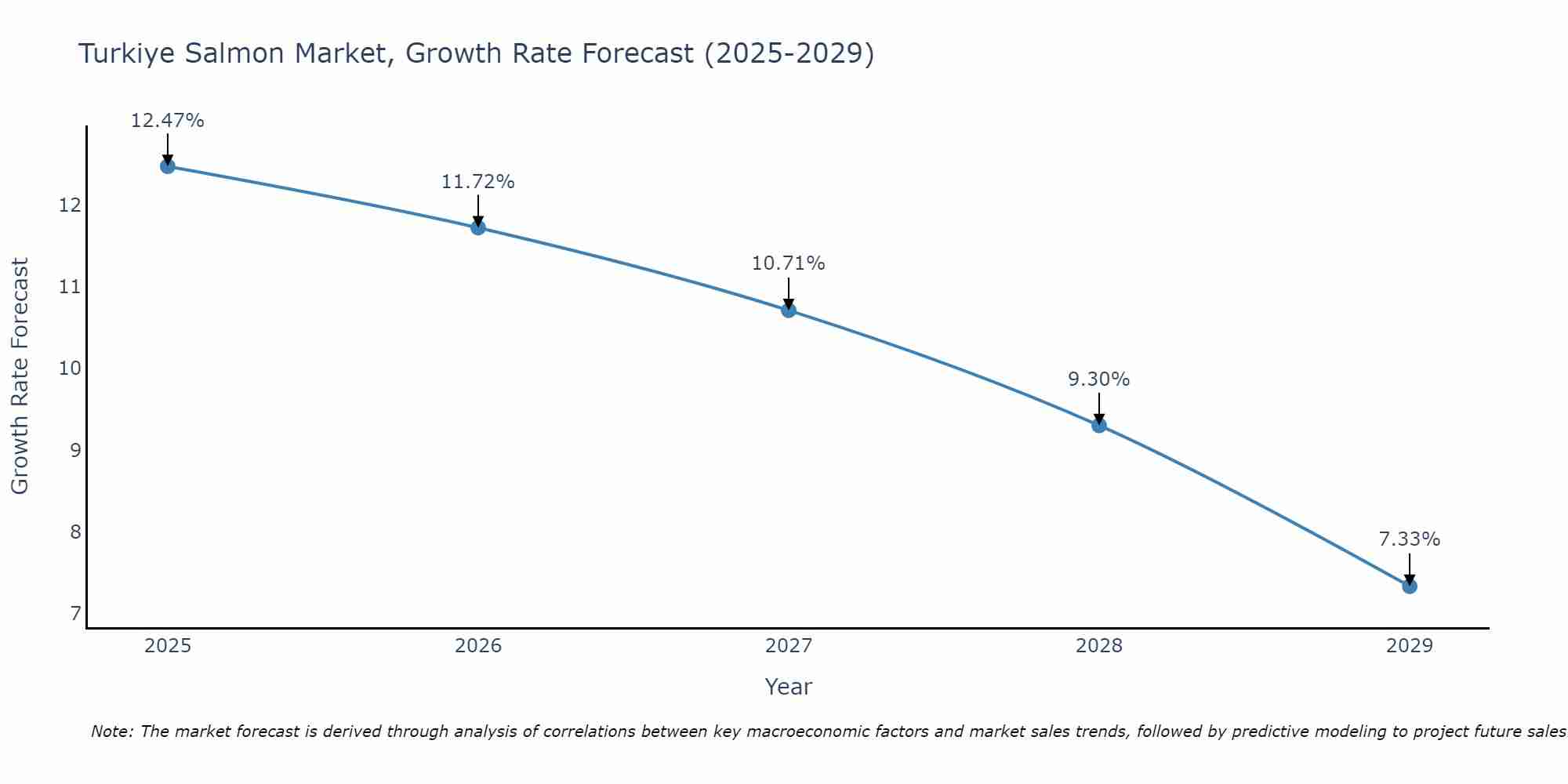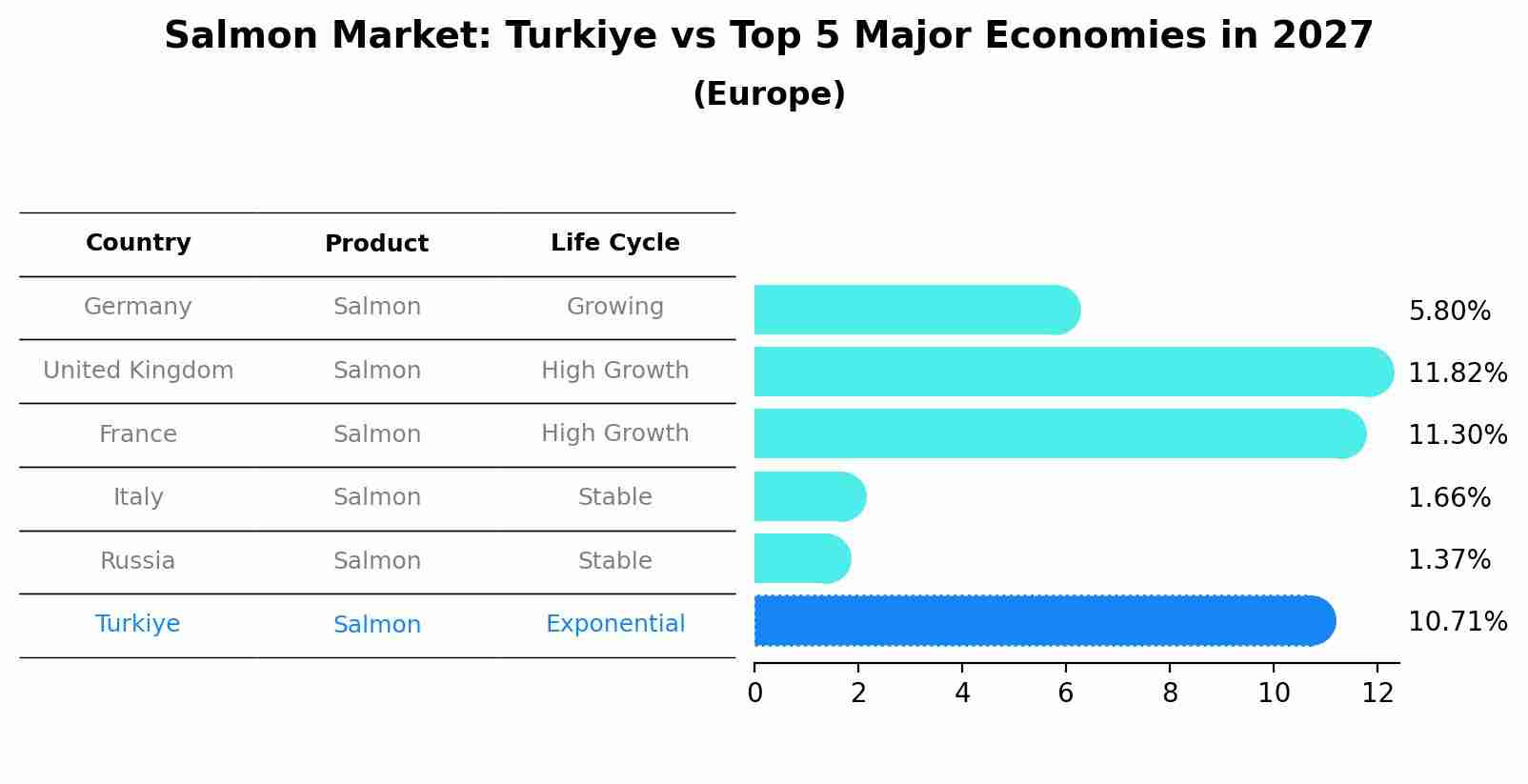Turkey Salmon Market (2025-2031) Outlook | Growth, Companies, Analysis, Forecast, Size, Share, Revenue, Trends, Value & Industry
| Product Code: ETC387638 | Publication Date: Aug 2022 | Updated Date: Jul 2025 | Product Type: Market Research Report | |
| Publisher: 6Wresearch | Author: Dhaval Chaurasia | No. of Pages: 75 | No. of Figures: 35 | No. of Tables: 20 |
Turkiye Salmon Market Size Growth Rate
The Turkiye Salmon Market could see a tapering of growth rates over 2025 to 2029. Although the growth rate starts strong at 12.47% in 2025, it steadily loses momentum, ending at 7.33% by 2029.

Salmon Market: Turkiye vs Top 5 Major Economies in 2027 (Europe)
By 2027, the Salmon market in Turkiye is anticipated to reach a growth rate of 10.71%, as part of an increasingly competitive Europe region, where Germany remains at the forefront, supported by United Kingdom, France, Italy and Russia, driving innovations and market adoption across sectors.

Turkey Salmon Market Synopsis
The Turkey salmon market is experiencing steady growth driven by increasing consumer awareness of the health benefits associated with salmon consumption. Turkey`s growing middle-class population and changing dietary preferences towards healthier options have also contributed to the rise in demand for salmon products. The market offers a variety of salmon products including fresh, frozen, smoked, and canned options, catering to different consumer preferences. Imported salmon, particularly from Norway and other European countries, dominates the market due to its perceived higher quality. However, there is also a growing trend towards domestic salmon production to meet the increasing demand. Key players in the Turkey salmon market include seafood importers, wholesalers, retailers, and online platforms offering a wide range of salmon products to cater to diverse consumer needs.
Turkey Salmon Market Trends
The Turkey Salmon Market is experiencing a growing demand for fresh and sustainably sourced salmon products. Consumers are increasingly seeking healthier protein options, driving the popularity of salmon due to its high nutritional value and omega-3 fatty acids content. There is also a rising interest in premium and value-added salmon products, such as smoked salmon, marinated salmon, and ready-to-eat salmon meals, catering to the convenience-seeking consumers. Additionally, the awareness of the environmental impact of salmon farming practices is leading to a preference for responsibly farmed salmon products. As a result, there is an emerging market for organic and eco-friendly salmon options in Turkey. Overall, the Turkey Salmon Market is witnessing a shift towards quality, sustainability, and innovation to meet the evolving consumer preferences.
Turkey Salmon Market Challenges
In the Turkey Salmon Market, one of the main challenges faced is the competition from other types of fish and seafood products that are more traditionally consumed in the region. Salmon is not a native fish to Turkey, so the market must work harder to educate consumers about the benefits and versatility of salmon compared to local fish varieties. Additionally, logistical challenges such as transportation and storage can impact the availability and freshness of salmon in the market. Economic factors, such as fluctuating prices and currency exchange rates, can also affect the affordability and demand for salmon among Turkish consumers. Overall, building awareness, addressing logistical issues, and managing economic fluctuations are key challenges in the Turkey Salmon Market.
Turkey Salmon Market Investment Opportunities
The Turkey Salmon Market presents promising investment opportunities due to growing consumer demand for healthy and premium seafood products. With the increasing awareness of the health benefits associated with consuming salmon, there is a rising trend of incorporating salmon into diets in Turkey. Investors could explore opportunities in salmon farming operations, distribution networks, retail channels, and value-added products such as smoked salmon or ready-to-eat meals. Additionally, the potential for expanding exports to other countries could further drive growth in the market. Investing in technological advancements for sustainable and efficient salmon farming practices could also be a lucrative opportunity in the Turkey Salmon Market. Overall, the market offers room for expansion and innovation, making it an attractive sector for potential investors.
Jordan Agar Market Government Policies
The government policies related to the Turkey Salmon Market primarily revolve around food safety regulations, import restrictions, and sustainability measures. The Turkish government strictly enforces regulations to ensure the quality and safety of salmon products entering the market, including inspections of processing facilities and adherence to hygiene standards. Import restrictions are in place to protect domestic producers and regulate the flow of imported salmon products. Additionally, there is a growing emphasis on sustainability in the salmon industry, with government initiatives promoting responsible fishing practices and aquaculture methods. Overall, the government`s policies aim to maintain a balance between supporting the growth of the salmon market in Turkey while safeguarding consumer health, domestic producers, and the environment.
Turkey Salmon Market Future Outlook
The future outlook for the Turkey Salmon Market appears promising as consumer demand for healthy and sustainable seafood options continues to rise. With increasing awareness of the health benefits of salmon consumption and growing interest in seafood as a protein source, the market is expected to experience steady growth. Additionally, advancements in aquaculture technology and sustainable fishing practices are likely to support the supply of high-quality salmon products in the market. As Turkey`s economy continues to develop and consumers become more willing to pay a premium for premium seafood products, there is potential for further expansion and diversification within the salmon market. Overall, the Turkey Salmon Market is poised for a positive trajectory in the coming years.
Key Highlights of the Report:
- Turkey Salmon Market Outlook
- Market Size of Turkey Salmon Market, 2024
- Forecast of Turkey Salmon Market, 2031
- Historical Data and Forecast of Turkey Salmon Revenues & Volume for the Period 2021 - 2031
- Turkey Salmon Market Trend Evolution
- Turkey Salmon Market Drivers and Challenges
- Turkey Salmon Price Trends
- Turkey Salmon Porter's Five Forces
- Turkey Salmon Industry Life Cycle
- Historical Data and Forecast of Turkey Salmon Market Revenues & Volume By Type for the Period 2021 - 2031
- Historical Data and Forecast of Turkey Salmon Market Revenues & Volume By Chinook Salmon for the Period 2021 - 2031
- Historical Data and Forecast of Turkey Salmon Market Revenues & Volume By Coho Salmon for the Period 2021 - 2031
- Historical Data and Forecast of Turkey Salmon Market Revenues & Volume By Pink Salmon for the Period 2021 - 2031
- Historical Data and Forecast of Turkey Salmon Market Revenues & Volume By Red Salmon for the Period 2021 - 2031
- Historical Data and Forecast of Turkey Salmon Market Revenues & Volume By Salmo Salar for the Period 2021 - 2031
- Historical Data and Forecast of Turkey Salmon Market Revenues & Volume By Silverbrite Salmon for the Period 2021 - 2031
- Historical Data and Forecast of Turkey Salmon Market Revenues & Volume By End Product Type for the Period 2021 - 2031
- Historical Data and Forecast of Turkey Salmon Market Revenues & Volume By Fresh for the Period 2021 - 2031
- Historical Data and Forecast of Turkey Salmon Market Revenues & Volume By Frozen for the Period 2021 - 2031
- Historical Data and Forecast of Turkey Salmon Market Revenues & Volume By Canned for the Period 2021 - 2031
- Historical Data and Forecast of Turkey Salmon Market Revenues & Volume By Others for the Period 2021 - 2031
- Historical Data and Forecast of Turkey Salmon Market Revenues & Volume By Distribution Channel for the Period 2021 - 2031
- Historical Data and Forecast of Turkey Salmon Market Revenues & Volume By Retail Stores for the Period 2021 - 2031
- Historical Data and Forecast of Turkey Salmon Market Revenues & Volume By Hypermarket/supermarket for the Period 2021 - 2031
- Historical Data and Forecast of Turkey Salmon Market Revenues & Volume By Online Sales Channels for the Period 2021 - 2031
- Turkey Salmon Import Export Trade Statistics
- Market Opportunity Assessment By Type
- Market Opportunity Assessment By End Product Type
- Market Opportunity Assessment By Distribution Channel
- Turkey Salmon Top Companies Market Share
- Turkey Salmon Competitive Benchmarking By Technical and Operational Parameters
- Turkey Salmon Company Profiles
- Turkey Salmon Key Strategic Recommendations
Frequently Asked Questions About the Market Study (FAQs):
- Single User License$ 1,995
- Department License$ 2,400
- Site License$ 3,120
- Global License$ 3,795
Search
Thought Leadership and Analyst Meet
Our Clients
Related Reports
- Canada Oil and Gas Market (2026-2032) | Share, Segmentation, Value, Industry, Trends, Forecast, Analysis, Size & Revenue, Growth, Competitive Landscape, Outlook, Companies
- Germany Breakfast Food Market (2026-2032) | Industry, Share, Growth, Size, Companies, Value, Analysis, Revenue, Trends, Forecast & Outlook
- Australia Briquette Market (2025-2031) | Growth, Size, Revenue, Forecast, Analysis, Trends, Value, Share, Industry & Companies
- Vietnam System Integrator Market (2025-2031) | Size, Companies, Analysis, Industry, Value, Forecast, Growth, Trends, Revenue & Share
- ASEAN and Thailand Brain Health Supplements Market (2025-2031) | Strategy, Consumer Insights, Analysis, Investment Trends, Opportunities, Growth, Size, Share, Industry, Revenue, Segments, Value, Segmentation, Supply, Forecast, Restraints, Outlook, Competition, Drivers, Trends, Demand, Pricing Analysis, Competitive, Strategic Insights, Companies, Challenges
- ASEAN Bearings Market (2025-2031) | Strategy, Consumer Insights, Analysis, Investment Trends, Opportunities, Growth, Size, Share, Industry, Revenue, Segments, Value, Segmentation, Supply, Forecast, Restraints, Outlook, Competition, Drivers, Trends, Demand, Pricing Analysis, Competitive, Strategic Insights, Companies, Challenges
- Europe Flooring Market (2025-2031) | Outlook, Share, Industry, Trends, Forecast, Companies, Revenue, Size, Analysis, Growth & Value
- Saudi Arabia Manlift Market (2025-2031) | Outlook, Size, Growth, Trends, Companies, Industry, Revenue, Value, Share, Forecast & Analysis
- Uganda Excavator, Crane, and Wheel Loaders Market (2025-2031) | Strategy, Consumer Insights, Analysis, Investment Trends, Opportunities, Growth, Size, Share, Industry, Revenue, Segments, Value, Segmentation, Supply, Forecast, Restraints, Outlook, Competition, Drivers, Trends, Demand, Pricing Analysis, Competitive, Strategic Insights, Companies, Challenges
- Rwanda Excavator, Crane, and Wheel Loaders Market (2025-2031) | Strategy, Consumer Insights, Analysis, Investment Trends, Opportunities, Growth, Size, Share, Industry, Revenue, Segments, Value, Segmentation, Supply, Forecast, Restraints, Outlook, Competition, Drivers, Trends, Demand, Pricing Analysis, Competitive, Strategic Insights, Companies, Challenges
Industry Events and Analyst Meet
Whitepaper
- Middle East & Africa Commercial Security Market Click here to view more.
- Middle East & Africa Fire Safety Systems & Equipment Market Click here to view more.
- GCC Drone Market Click here to view more.
- Middle East Lighting Fixture Market Click here to view more.
- GCC Physical & Perimeter Security Market Click here to view more.
6WResearch In News
- Doha a strategic location for EV manufacturing hub: IPA Qatar
- Demand for luxury TVs surging in the GCC, says Samsung
- Empowering Growth: The Thriving Journey of Bangladesh’s Cable Industry
- Demand for luxury TVs surging in the GCC, says Samsung
- Video call with a traditional healer? Once unthinkable, it’s now common in South Africa
- Intelligent Buildings To Smooth GCC’s Path To Net Zero


















